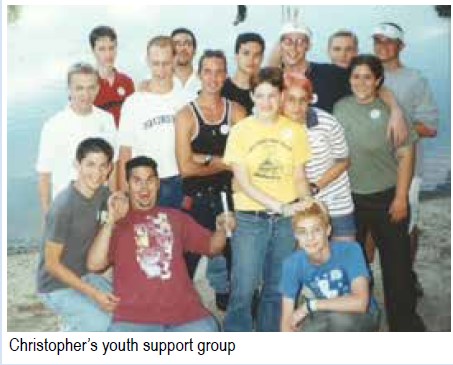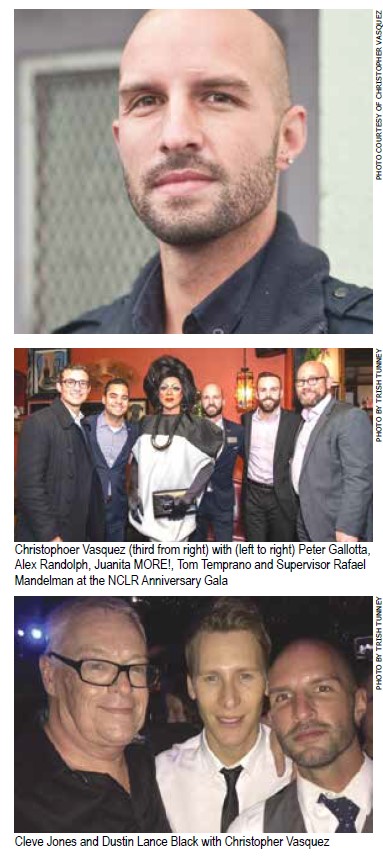
By Christopher Vasquez–
I think it’s safe to say that most queer youth don’t imagine their coming out story to take place in the press. It’s very safe to say that I did not imagine mine would take place in the pages of The New York Times, on the air on NPR, or on people’s TV sets during MTV News. But that’s where my journey as a young, newly-out LGBTQ-activist youth started.
My story as a gay man starts as many do for queer youth in less-than-progressive Central Florida two decades ago—deeply in the closet and afraid that family and high school friends would find out the secret that I had been hoping for a long time was just a mistake. But as I came to realize in myself that what I was feeling wasn’t actually a mistake, but was actually a part of who I was and something I couldn’t change no matter how much I hoped and prayed, I knew that I needed some way to cope, some people to be open around.
Luckily that desire to find other people who were in the same situation as I was, who could understand the internal strife I was dealing with, but, most importantly, who I could be honest and out with, led me to find a youth support group at the LGBTQ Center in Orlando. It was there, at the Gay and Lesbian Idea eXchange for Youth (GALIXY), that I found my first chosen family, the first place I ever felt comfortable telling someone outside of an anonymous internet chat room that I was gay.

Finally, I had an outlet. It felt refreshing to have peers my age whom I could open up to and share joint feelings of fear, but also more prescient feelings of hope. As I opened up to them, I found the support that I needed to start blossoming. As I opened up to these fellow queer youth, I felt comfortable learning from their shared experiences, and by proxy, more comfortable with myself.
But this time with the support group didn’t just introduce me to youth who were just like me; it gave me the conduit to meet LGBTQ adults and elders who all had their own stories of, and paths to coming out, to share. And was I ever eager to learn from them! Their stories gave me hope, provided me guidance, and taught me the history of the community where I was starting to find my home.
Through these LGBTQ “elders” (I dread the thought that youth my age then thinks a person my age now might be considered an elder), I learned about the story of Stonewall, the birth of the queer liberation movement, the legacy of Harvey Milk, the devastation of the AIDS epidemic, and the resiliency of the LGBTQ community. It was through this transfer of knowledge from their generation to mine that my nascent activism was fostered.
See, I had always had progressive views. Having grown up poor with a single mother raising four boys, I understood firsthand the importance of social safety nets and free lunches. But learning about the fight for LGBTQ freedom and equality gave me something more personal to fight for, something about me that couldn’t be changed, so I had to join the fight to have society change their views (and laws) on me instead.

(I know, this is a winding path to a coming out story, but I’m a Southerner at heart and all y’all know we aren’t good with telling short stories or brevity. I swear, it’s coming soon.)
But now I felt emboldened. I had a newfound purpose as well as a strong base of support in my coming-out infancy that allowed me to take a leap and dive early-on into LGBTQ activism. And dive-in head first I did. I remember clearly the moment I was asked if I wanted to take part in a Youth Lobby Day taking LGBTQ youth to the Florida capital with Equality Florida (EQFL) to advocate on behalf of a non-discrimination bill that would ban bullying based on sexual orientation and gender identity in the state’s public schools. I think my exact response was, “[Expletive] yes, I want to go!”
There I found myself, in a passenger van a week later traveling up to Tallahassee with 11 other queer youth who were eager to prove to our state legislators why this Dignity for All Students bill was so important to us. Newly out to a few friends, and already about to out myself to a legislator, I was terrified.
I was asked by EQFL if they could attach a reporter to our little group going to our state senator’s office that day, and as fortune has it, we all were okay with this. Because what happened next will always be seared into my memory. After the four of us told our deeply personal stories of overcoming fear, depression, and, in some cases, physical bullying in our schools, our state senator thanked us for sharing and then proceeded to lecture us for a solid five minutes on why our souls were doomed to hell for all eternity because of the “choice” we had made—in front of a journalist with the state’s largest paper.
It was after this “cordial” meeting with my elected representative that my coming out story really hit overdrive. Because of the reporter in the room documenting the biblical talking-down-to we had received, it instantly became newsworthy and I had to make the decision if my newfound path of advocacy was strong enough to overcome the fear of coming out publicly in the press to tell my side of the story.
As you can imagine, I chose the path to move forward (with great support and encouragement from EQFL staff, including my first mentor Nadine Smith). So, there I was, 16, newly-out to friends, but about to become the chief subject of an article that within 24 hours would be picked up by the AP and turned into a national news story, making its way to outlets like NPR and the press releases of U.S. congresspeople. (https://tinyurl.com/4m7es9cx)
My coming out story was more public and sudden than most, but I’d like to think the choice that I made that day to come out that way helped change the world for the better for at least a handful of LGBTQ youth. I would never dream of having done it any differently now.
Christopher Vasquez is the Communications Director for the National Center for Lesbian Rights. He oversees the organization’s day-to-day and long-term communications that elevate key NCLR leaders, advances the organization’s initiatives, contributes to the organization’s overall strategic planning, and serves on national communications coalitions working to achieve LGBTQ equality.
Published on March 11, 2021





Recent Comments